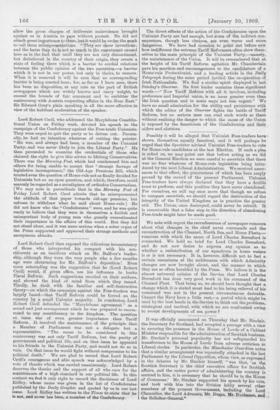Lord Robert Cecil then exposed the ridiculous inconsistency of those
who interpreted his compact with his con- stituents as an insidious attack on Mr. Balfour's leader- ship, although they were the very people who a few months ago were clamouring for Mr. Balfour's deposition ! Even more astounding was the suggestion that he (Lord Robert Cecil) would, if given office, use his influence to burke Fiscal Reform. Such suggestions recoiled on their authors, and showed the kind of mind from which they issued. Finally, he dealt with the familiar and self-destructive theory—on which the campaign against the Free-fooders was largely based—that Tariff Reform could be forced on the country by s MA Unionist majority. In conclusion, Lord Roberti Cecil defended the " Marylebone agreement" as a sound and just arrangement which he was prepared to recom- mend to any constituency in the kingdom. The question at issue was of even greater importance than Tariff Reform. It involved the maintenance of the principle that a Member of Parliament was not a delegate but a representative. "The cause to be considered in this controversy was not only Tariff Reform, but the purity of government and political life, and on that issue he appealed to his friends in the Unionist Party, and would not do so in vain. On that issue he would fight without compromise to his political death." Wo are glad to record that Lord Robert Cecil's courageous and able speech was acknowledged by a vote of thanks which was curried unanimously. Lord Robert deserves the thanks and the support of all who care for the maintenance of a high standard in our political life. In this context we feel it only right to record the disclaimer of Lord Ridley, whose name was given in the list of Confederates published by the Daily Graphic and quoted by us in our last issue. Lord Ridley has written to the Times testate that he Is net, and never has been, a Member of the Confederacy.
























































 Previous page
Previous page